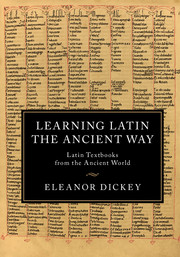7 - Transliterated texts
Published online by Cambridge University Press: 05 March 2016
Summary
A significant percentage of Latin learners did not learn the alphabet. Such learners must have been interested in oral proficiency rather than in the capacity to read or write, and it may well be that the majority of what they did is now lost to us because it was done orally and never written down. Some of these learners, however, have signaled their presence by producing transliterated Latin-learning texts, with the Latin in Greek script. Such texts are more common than the ones with the Latin in Roman script until the third century ad but become fairly rare after that century.
Additional transliterated texts, complete with the original Greek, can be found in passages 8.10, 8.13, and 8.15–16.
A transliterated colloquium
A papyrus of the fifth or sixth century ad (P.Berol. inv. 10582) contains a trilingual colloquium in Latin, Greek, and Coptic. Originally this text would have resembled the colloquia in section 2.1, to which it is historically related, but it has been adapted for use by a very different group of Latin learners, apparently Coptic speakers. The section given here depicts the end of a dinner party; the beginning of the meal is unfortunately missing.
The transliteration reflects the pronunciation of both Latin and Greek in late antiquity: Latin b and v, originally pronounced like our b and w respectively, had both come to be pronounced more like our v, while Greek beta had come to have a similar sound; beta is therefore used to transcribe both b and v. The Latin vowel u continued to be pronounced like our u, while Greek upsilon had turned into a fronted vowel that sounded different (like modern French u); the digraph omicron upsilon is therefore used to transcribe u. The sound of h had been lost, though it might well not have been written in Greek anyway since breathings were often omitted in Greek papyri. The sound of qu is usually transcribed with kappa omicron, though there is some variation. The letters i and e are sometimes confused, as these sounds had merged in some circumstances. In addition the transliteration contains outright mistakes that cannot derive from the way either Latin or Greek was pronounced, such as ακκεντιδε for accendite in 11 and εστ for et in 29. Another portion of this text can be found in passage 8.10.
- Type
- Chapter
- Information
- Learning Latin the Ancient WayLatin Textbooks from the Ancient World, pp. 121 - 127Publisher: Cambridge University PressPrint publication year: 2016



